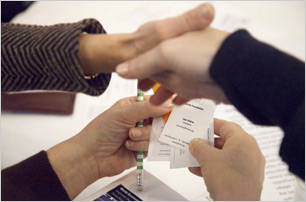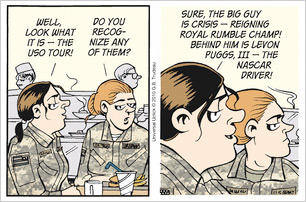
Street FightObama momentarily drops his outrage over banker bonuses. Oops.
Posted Friday, Feb. 12, 2010, at 2:25 PM ET Politicians sometimes get themselves into trouble by letting their emotions get the better of them. (Chuck Grassley, call your office.) For President Obama, the reverse is true: He lets his reason get the better of him.
Politicians sometimes get themselves into trouble by letting their emotions get the better of them. (Chuck Grassley, call your office.) For President Obama, the reverse is true: He lets his reason get the better of him.
When asked in a Bloomberg News interview about the $9 million awarded to Lloyd Blankfein, CEO of Goldman Sachs, and the $17 million for Jamie Dimon, CEO of JPMorgan Chase, Obama said he did not "begrudge people success or wealth." He called the two bankers "very savvy businessmen." And he said that while "$17 million is an extraordinary amount of money," there are also baseball players who make a lot of money without succeeding. "So I'm shocked by that as well."
The outrage police were quick to pounce—from all sides. "Clueless," Paul Krugman deemed Obama's comments, concluding: "We're doomed." The National Republican Congressional Committee framed the interview as "OBAMA SUDDENLY SCALES BACK ANTI-WALL STREET RHETORIC." Obama's remarks were enough to drive Bill Kristol of the Weekly Standard to utter the difficult words, "Paul Krugman is … right."
The outcry was so harsh that the White House posted an entire blog item "Clearing Up the Bonuses Issue" and provided a more complete interview transcript. At Thursday's press conference, press secretary Robert Gibbs fielded probing questions about how angry Obama really is:
Q: Are those obscene bonuses, Blankfein's and Dimon's?
Gibbs: The president has spoken repeatedly on these bonuses, and finds them, as he did in here, extraordinary and shocking.
Q: Has he been asked specifically about Blankfein and Dimon?
Gibbs: And he said extraordinary and shocking, specifically.
Q: Are they obscene, are they an offense, are they a violation of our moral principles?
Gibbs: The president doesn't have any different view on bonuses yesterday than he had 10 days ago or 10 months ago.
Seriously, though: Would the president be willing to come out right now and light himself on fire to protest the Wall Street bonuses?
Back in December, Obama drew fire for not being angry enough about, among other things, Wall Street CEO bonuses. He soon dialed up the rhetoric. He called the Wall Street tradition of sky-high bonuses "obscene" and "shameful." He called bankers "fat cats" who don't get it. "They're still puzzled why is it that people are mad at the banks," he said in an interview with 60 Minutes in December. "Well, let's see. You guys are drawing down $10 [million], $20 million bonuses after America went through the worst economic year that it's gone through in—in decades, and you guys caused the problem. And we've got 10 percent unemployment."
What Obama doesn't seem to understand is that, for politicians, outrage can't be just momentary. It needs to be sustained over time—enhanced, even. If a politician is outraged by something, he must be outraged by it every time anyone brings it up.
The gripes against Obama's comments are of varying legitimacy:
Obama said he doesn't "begrudge" the CEOS their bonuses. Not quite. What he said, in context, is that "I, like most of the American people, don't begrudge people success or wealth. That's part of the free market system." This is a sentiment he has expressed many times before. No blowups ensued.
He praised the bankers' "business savvy." Fair enough. Not only did Dimon and Blankfein receive bonuses, they did so only because American taxpayers bailed them out after their companies nearly failed. That's savvy? Furthermore, Obama knows Dimon and Blankfein personally—he and Dimon are friends from Chicago—raising the possibility that he is reluctant to chastise people he knows.
He compared bankers to baseball players. "First of all, to my knowledge, irresponsible behavior by baseball players hasn't brought the world economy to the brink of collapse and cost millions of innocent Americans their jobs and/or houses," Krugman wrote. Worse, the banker/ballplayer comparison is one Republicans often make, as if to diminish the outlandish sums. To liberals, Obama sounded like he was parroting a GOP talking point.
No doubt Obama could have been more tactful. He didn't have to defend the two CEOs, nor did he have to minimize the outlandishness of bonuses in the eyes of most Americans. But a shocking reversal? Hardly. It seems more an example of Obama's penchant for nuance when what his supporters want—and even his non-supporters want—is simplicity. He gave his usual on-the-one-hand, on-the-other-hand, but seemed to forget the second hand. He defended the American pursuit of health, wealth, and happiness without sufficiently emphasizing the American need to curb that pursuit when it crosses the line into taxpayer-financed greed. And on policy, he was the same-old, same-old: Obama said, as he has for some time, that company shareholders should have more say over the size of bonuses and that bonuses should be tied to a company's performance. No, he did not advocate capping or levying heavier taxes on banker bonuses. But it's unclear that the proposed legislation in the House and Senate that would do so will catch on. Obama's dearth was mainly one of emotion.
Heat has never been Obama's strong suit. Cool, calm, reflective, nuanced—these are the preferred presidential adjectives. When tipsters suggested in the run-up to the State of the Union that Obama needed to get angry, one wondered whether they had been paying attention for the past three years. Obama doesn't do angry. If anything, his flash of rage at banker bonuses in December was the outlier—not his relative calm this time around. That's what makes his supporters so mad.
Become a fan of Slate on Facebook. Follow us on Twitter.
on the Fray
 More Evidence That the GOP Is in No Way Serious About Health Care Reform
More Evidence That the GOP Is in No Way Serious About Health Care Reform Shafer: The 12 Lame Excuses Plagiarists Give for Stealing
Shafer: The 12 Lame Excuses Plagiarists Give for Stealing Don't You Dare Try To Duck This Gitmo Case, Supreme Court
Don't You Dare Try To Duck This Gitmo Case, Supreme Court Why It's Safe To Ignore Food Expiration Dates
Why It's Safe To Ignore Food Expiration Dates Troy Patterson on the Olympics' Worst Figure Skating Costumes
Troy Patterson on the Olympics' Worst Figure Skating Costumes The History and Use of Fake Beards in International Espionage
The History and Use of Fake Beards in International Espionage














